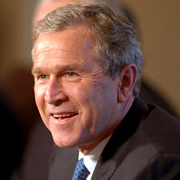Seven Democratic primaries on Super Tuesday all but eliminated most of the party’s presidential hopefuls, leaving John Kerry, John Edwards, Wesley Clark and Howard Dean to continue their fight to take on President George W. Bush in the fall elections. Who’s leading the Democratic pack? Are Republican leaders ready for the competition?
Super Tuesday – seven Democratic primaries within 24 hours – has all but eliminated several presidential hopefuls, including one-time forerunner Howard Dean. The former Vermont governor admitted Tuesday evening that his campaign is almost out of money, but pledged to continue stumping all the way to the July convention in Boston.
Massachusetts Sen. John Kerry, who won five states Tuesday, has increasingly become the target of attacks from many fellow Democrats and GOP leaders. He’s been called a neo-Kennedy liberal, and Sen. John Edwards’ overwhelming win in South Carolina at least delayed any hopes Kerry had to prove he can win over the South.
Dean supporter Nabil al-Tikriti, history instructor and an Iraqi American, was among five other panelists gathered Tuesday night in the St. Charles Room for a debate on the presidential candidates. Al-Tikriti argued that Dean was one of the only candidates who’d consistently stood against the war in Iraq, an issue that promises to be a central debate going into the fall election.
“Kerry voted for both major resolutions” that allowed Bush to send troops to Iraq, al-Tikriti said. “That war was an abomination.”
A former candidate for state representative, Republican Randy Evans defended Bush’s policies, even citing former Gen. Wesley Clark’s support of U.S. intervention in Iraq.
“Clark said that he felt there was sufficient evidence” for sending troops, Evans said. “Seventeen European nations have been supportive of our effort in Iraq. There was a clear violation of U.N. resolutions and weapons restrictions.”
Evans also brought up Bush’s “No Child Left Behind” program and commitment of nearly $8 billion to schools.
“He [Bush] has tackled the fundamental problem in this country of public education,” Evans said. “When he came into office, only 11 states met federal competency requirements. Now all 50 states are in compliance.”
Bush remained in Washington Wednesday for a luncheon with Republican National committee leaders, while Kerry took the day off at his home in Boston. Clark, who took the most votes among candidates in Oklahoma, has been touring Tennessee, a state the Al Gore failed to win in the 2000 elections. Edwards moved on to Virginia and then New York to rally support in those states’ upcoming primaries, while Dean has promised to make last-ditch efforts in Michigan and Washington.

Howard Dean (courtesy of Mark Harlan)

Wesley Clark

John Edwards

John Kerry






